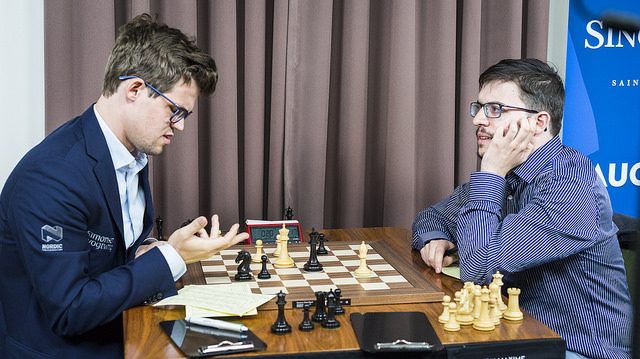 FLAG! That is the word that moved your opponent’s brain right out of the time scramble zone. He had 90 minutes to make 40 moves (40/90,d5) in the game’s first time control, and your claim is that the general of the black pieces only made 39 moves before his time ran out. You have a scoresheet to prove it—or do you? Your adversary pauses the game timer and challenges your claim. He does not believe that your scoresheet is complete—reasonably complete scoresheets are a must for this claim to be valid (in general single time control games, quick chess, and blitz don’t count here).
“I can prove,” he exclaims to the TD, “that I made enough moves before time ran out. Give me a moment so that I can replace my check marks with accurate notation—I remember all of the missing moves.” The TD immediately points out that once the claim has been made neither player may fill in missing moves or correct any previous notational errors. Those missing or corrected moves need to be scribbled in by both players before the claim is made.
The TD finds your score is accurate up to: 37.Kd5 ___ 38.___ ___ 39.___ ___. Are those five missing moves or three missing move pairs? And does it matter?
The rule allows for no more than a total of three missing or inaccurate move pairs. Move 37 is missing one move for black; thus, creating one missing move and one missing move pair. The two missing individual moves, one for white and one for black, for move 38 count together as only one missing move pair (while 37.Kd5 ___ 38.___ ___ is three missing moves, it is only two missing move pairs)--ditto for move 39. The TD upholds your claim. Missing moves are not always the same as missing move pairs.
FLAG! That is the word that moved your opponent’s brain right out of the time scramble zone. He had 90 minutes to make 40 moves (40/90,d5) in the game’s first time control, and your claim is that the general of the black pieces only made 39 moves before his time ran out. You have a scoresheet to prove it—or do you? Your adversary pauses the game timer and challenges your claim. He does not believe that your scoresheet is complete—reasonably complete scoresheets are a must for this claim to be valid (in general single time control games, quick chess, and blitz don’t count here).
“I can prove,” he exclaims to the TD, “that I made enough moves before time ran out. Give me a moment so that I can replace my check marks with accurate notation—I remember all of the missing moves.” The TD immediately points out that once the claim has been made neither player may fill in missing moves or correct any previous notational errors. Those missing or corrected moves need to be scribbled in by both players before the claim is made.
The TD finds your score is accurate up to: 37.Kd5 ___ 38.___ ___ 39.___ ___. Are those five missing moves or three missing move pairs? And does it matter?
The rule allows for no more than a total of three missing or inaccurate move pairs. Move 37 is missing one move for black; thus, creating one missing move and one missing move pair. The two missing individual moves, one for white and one for black, for move 38 count together as only one missing move pair (while 37.Kd5 ___ 38.___ ___ is three missing moves, it is only two missing move pairs)--ditto for move 39. The TD upholds your claim. Missing moves are not always the same as missing move pairs.
 Magnus Carlsen and Maxime Vachier-Lagrave, studying scoresheets post mortem in the 2017 Sinquefield Cup, Photo Lennart Ootes
Magnus Carlsen and Maxime Vachier-Lagrave, studying scoresheets post mortem in the 2017 Sinquefield Cup, Photo Lennart OotesCheckmarks on a scoresheet can bear the blame for TDs’ rejecting many a claim.
It is a common practice to use checkmarks in place of notation during time trouble, but it is still not acceptable as notation. Those checkmarks are good for keeping track of the move count, but nothing else—and remember clock move counters don’t count at all and are worthless in making claims. If you have the time left on your clock before your flag falls, you might try fixing your scoresheet before making a claim. Move on the board then write your score, this avoids the claim that you may find a bore. The main rule is that you must make your move on the board first, and then notate it on your scoresheet. This rule has a variation that allows wood pushers to first notate their move before making it on the chessboard. This variance never applies to electronic scoresheets. Since this variation is allowed to be unannounced, you should check with the TD to find out if the main rule or the variation applies to the tournament you signed up for. The concept in the main rule is that when a move is written, erased, written, erased, etc.it is considered note taking—and note taking is against the rules. So the line was drawn in the sand by the law-givers to not even allow the process to start when even one notation was written down before a move was played. The main rule caused a lot of wailing and gnashing of teeth; thus, the variation. Besides the header info, only actual game moves, draw offers and clock times are allowed to be written on a scoresheet. Are you missing moves on your score? Use your rival’s to get more. You may fill in your own scoresheet using your opponent's scoresheet while your clock is running and both of you have at least five minutes left on your clock displays. If your opponent objects, get a TD. Tim Just is a National Tournament Director, FIDE National Arbiter, and editor of the 5th & 6th edition of the US Chess Rulebook. He is also the author of My Opponent is Eating a Doughnut & Just Law, which are both available from US Chess Sales and Amazon/Kindle. Additionally, Tim recently revised The Guide To Scholastic Chess, a guide created to help teachers and scholastic organizers who wish to begin, improve, or strengthen their school chess program. Tim is also a member of the US Chess Rules Committee. His new column, exclusive to US Chess, “Just the Rules” will help clarify potentially confusing regulations.
Tim Just is a National Tournament Director, FIDE National Arbiter, and editor of the 5th & 6th edition of the US Chess Rulebook. He is also the author of My Opponent is Eating a Doughnut & Just Law, which are both available from US Chess Sales and Amazon/Kindle. Additionally, Tim recently revised The Guide To Scholastic Chess, a guide created to help teachers and scholastic organizers who wish to begin, improve, or strengthen their school chess program. Tim is also a member of the US Chess Rules Committee. His new column, exclusive to US Chess, “Just the Rules” will help clarify potentially confusing regulations.Categories
Archives
- January 2026 (10)
- December 2025 (27)
- November 2025 (29)
- October 2025 (39)
- September 2025 (27)
- August 2025 (29)
- July 2025 (43)
- June 2025 (25)
- May 2025 (24)
- April 2025 (29)
- March 2025 (29)
- February 2025 (20)
- January 2025 (24)
- December 2024 (34)
- November 2024 (18)
- October 2024 (35)
- September 2024 (23)
- August 2024 (27)
- July 2024 (44)
- June 2024 (27)
- May 2024 (31)
- April 2024 (51)
- March 2024 (34)
- February 2024 (25)
- January 2024 (26)
- December 2023 (29)
- November 2023 (26)
- October 2023 (37)
- September 2023 (27)
- August 2023 (37)
- July 2023 (47)
- June 2023 (33)
- May 2023 (37)
- April 2023 (45)
- March 2023 (37)
- February 2023 (28)
- January 2023 (31)
- December 2022 (23)
- November 2022 (32)
- October 2022 (31)
- September 2022 (19)
- August 2022 (39)
- July 2022 (32)
- June 2022 (35)
- May 2022 (21)
- April 2022 (31)
- March 2022 (33)
- February 2022 (21)
- January 2022 (27)
- December 2021 (36)
- November 2021 (34)
- October 2021 (25)
- September 2021 (25)
- August 2021 (41)
- July 2021 (36)
- June 2021 (29)
- May 2021 (29)
- April 2021 (31)
- March 2021 (33)
- February 2021 (28)
- January 2021 (29)
- December 2020 (38)
- November 2020 (40)
- October 2020 (41)
- September 2020 (35)
- August 2020 (38)
- July 2020 (36)
- June 2020 (46)
- May 2020 (42)
- April 2020 (37)
- March 2020 (60)
- February 2020 (38)
- January 2020 (45)
- December 2019 (34)
- November 2019 (35)
- October 2019 (42)
- September 2019 (45)
- August 2019 (56)
- July 2019 (44)
- June 2019 (35)
- May 2019 (40)
- April 2019 (48)
- March 2019 (61)
- February 2019 (39)
- January 2019 (30)
- December 2018 (29)
- November 2018 (51)
- October 2018 (45)
- September 2018 (29)
- August 2018 (49)
- July 2018 (35)
- June 2018 (31)
- May 2018 (39)
- April 2018 (31)
- March 2018 (26)
- February 2018 (33)
- January 2018 (30)
- December 2017 (26)
- November 2017 (24)
- October 2017 (30)
- September 2017 (30)
- August 2017 (31)
- July 2017 (28)
- June 2017 (32)
- May 2017 (26)
- April 2017 (37)
- March 2017 (28)
- February 2017 (30)
- January 2017 (27)
- December 2016 (29)
- November 2016 (24)
- October 2016 (32)
- September 2016 (31)
- August 2016 (27)
- July 2016 (24)
- June 2016 (26)
- May 2016 (19)
- April 2016 (30)
- March 2016 (36)
- February 2016 (28)
- January 2016 (32)
- December 2015 (26)
- November 2015 (23)
- October 2015 (16)
- September 2015 (28)
- August 2015 (28)
- July 2015 (6)
- June 2015 (1)
- May 2015 (2)
- April 2015 (1)
- February 2015 (3)
- January 2015 (1)
- December 2014 (1)
- July 2010 (1)
- October 1991 (1)
- August 1989 (1)
- January 1988 (1)
- December 1983 (1)







